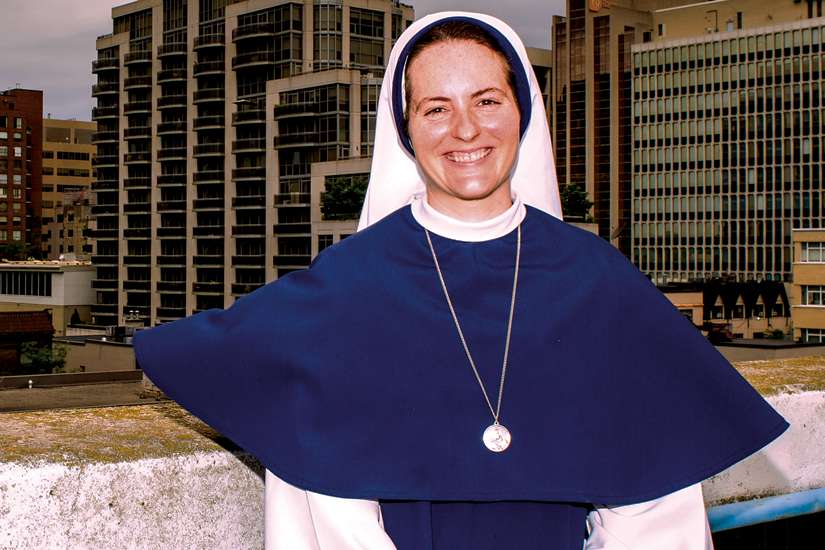“I’ve always felt very drawn to the stars. I think God often speaks to me through the stars,” she told The Catholic Register after professing final vows with the Sisters of Life in Toronto on Aug. 6. “It’s really where I think I have found the wonder of the universe. It’s what I think drew me to God in the first place.”
It also explains her religious name.
Sr. Mary Margaret used to be an aspiring astrophysicist studying for a PhD at Harvard University, probing the magnetic activity in dwarf stars.
She abandoned her doctoral studies for poverty, chastity and obedience almost a decade ago and is now installed as her order’s archivist and librarian in Manhattan. During her formation in Denver, Colo., she lectured at the Fiske Planetarium. But at 32, Sr. Mary Margaret’s scientific career is behind her.
“The thing we cling to most is our own wills,” she said. “But when we make that active choice — which is different from being an automaton and saying, ‘I’m just going to do what I’m told.’ No. It’s, ‘I’m going to choose to exercise my will by putting it in accord with what God wants,’ and God speaks to me through my superiors.”
Sr. Mary Margaret was raised in Toronto, the daughter of Reginald and Mary McLean and sister to Joseph. She studied astrophysics and astronomy while completing a B.Sc. at Queen’s University before moving on to Harvard to earn a Masters and begin her PhD work.
Sr. Mary Margaret thought perhaps she should join a teaching order where her academic credentials and aptitude for research would line up with the order’s mission. Joining the Sisters of Life — a 28-year-old community of 108 religious sisters dedicated to promoting teh sacredness of all life — Sr. Mary Margaret knew would be the end of her academic career.
“I knew that my heart was drawn to the Sisters of Life and I couldn’t really explain why,” she said.
“God knows better a lot of times. He can give us gifts that we didn’t know we had. There’s a kind of freedom in not having to say, ‘Oh well, because you studied astrophysics you need to work on this.’ Well, maybe I will do something different.”
The first different thing is poverty — first and most important of the vows. The Sisters of Life follow the Augustinian tradition of Catholic religious life and St. Augustine was quite insistent that poverty is the basis of religious life. Sisters of Life founder Cardinal John Joseph O’Connor, former archbishop of New York, was equally insistent.
“He said, the reason why poverty is the vow of the Sisters of Life is because poverty brings us into communion with the most vulnerable. There is no one more poor than the child in the womb,” Sr. Mary Margaret said.
For a religious, the point of living poor is not to masochistically deny every comfort and embrace every misery, but to directly experience being dependent on God.
“It’s a radical act of hope to let go of all the security of material goods,” Sr. Mary Margaret said. “Cardinal O’Connor would say that actually all the vows are forms of poverty. Obedience is the poverty of the will. Chastity is like a poverty of relationship, in a sense — or that intimate relationship of marriage. But they’re all about the sense of letting go of these external things so as to come closer to God.”
Chastity is the one that gets all the attention. In a culture where identities are formed and advertised on the basis of sexual preferences and histories, chastity can only be countercultural, according to Sr. Mary Margaret.
“The fact that we give up the chance to be married and have children is a kind of reparation for the impurity of the world, which is often at the root of a lot of the offences against the human person — whether it’s abortion or contraception. All of these things, they come out of this root of a lack of chastity and purity in the world,” she said.
A vow of obedience is almost as countercultural as chastity, in Sr. Mary Margaret’s books.
“There is a current of disobedience in the world,” she said. “Everyone is kind of obsessed with getting their own way. It’s all about me and what do I want, how do I see the world. Ultimately, that doesn’t lead to happiness.”
In Sr. Mary Margaret’s view, obedience unlocks the prison door of loneliness.
“True happiness comes from giving over your self to another, to someone you trust and love. That’s the witness we can give as religious, that happiness can come in not getting my own way and maybe doing something I don’t want to do. I’m living subject to another — which all of us are, to God and to authority,” she said.
For Sr. Mary Margaret and all the Sisters of Life those three essential vows are complemented by a fourth vow to protect the sacredness of life. The fourth vow is the lens she uses to examine poverty, chastity and obedience up close.
“It’s like my chastity is a form of reverence for my own self and others — to treat them with a pure love, to never use them,” she said.
As a scientist, Sr. Mary Margaret also knows her vows have to respond to the facts of life, the raw data of living in the world.
“The important point is to believe that there is something outside of ourselves — that I don’t define my own reality and my own truth,” she said. “We have to believe there is an actual truth out there. And that our goal should be to find that truth and not to define it ourselves.”


